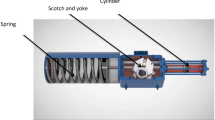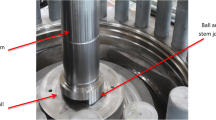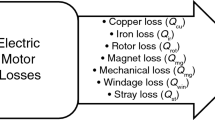Abstract
Variable valve timing to improve the torque and fuel consumption characteristics of gasoline engines is increasingly used in production engines. A basic decision-making criterion for the market launch of these concepts, in addition to marketing aspects, is the use/cost benefit of the different systems. In the following, some valve train concepts developed and tested at FEV Motorentechnik will be introduced. In addition, the use of variable valve trains for engines with controlled auto ignition as well as for boosted engine concepts will be discussed.
Similar content being viewed by others
References
Salber, W.; Duesmann, M.; Schwaderlapp, M.: Der Weg zur drosselfreien Laststeuerung: Vom Ventilabschalter bis zum elektromechanischen Ventiltrieb. TAE-Symposium Entwicklungstendenzen bei Ottomotoren, Ostfildern, 2002
Hahn, J.; Lang, O.; Ademes, N.: Mechanisch variable Ventilsteuerungen — Freiheitsgrade und Potenziale unterschiedlicher Systeme. Variable Ventilsteuerung II, Haus der Technik, Essen, 2004
Hahn, J.; Lauer, S.; Pischinger, S.; Salber, W.; Maassen, F.: Aufwand und Nutzen variabler Ventilsteuerungen bei 4-Takt-Ottomotoren. VDI Tagung, 2004
Lauer, S.; Lechner, M.; Hoffmann, H.: MV2T — Entwicklung eines variablen Ventiltriebs. Variable Ventilsteuerung II, Haus der Technik, Essen, 2004
Dilthey, J.: Möglichkeiten zur Verbesserung der drosselfreien Laststeuerung beim ottomotorischen Prozess. Aachen, Technische Hochschule, Dissertation 2004
Jené, H.: Einfluss des Einlassventilhubs auf den ottomotorischen Prozess mit variabler Ventilsteuerung. Aachen, Technische Hochschule, Dissertation 2005
Lang, O.; Habermann, S.; Wedowski, S.; Pischinger, S.; Wittler, M.: Optimierung des Instationärverhaltens aufgeladener Motoren. TAE Esslingen, Dez. 2004
Lang, O.; Salber, W.; Hahn, J.; Pischinger, S.; Hortmann, K.; Bücker, C.: Thermodynamical and Mechanical Approach Towards a Variable Valve Train for the Controlled Auto Ignition Combustion Process. SAE 2005-01-0762
Rights and permissions
About this article
Cite this article
Ademes, N., Lang, O., Lauer, S. et al. Valve train variability for advanced gasoline engines. MTZ Worldw 66, 9–12 (2005). https://doi.org/10.1007/BF03227806
Issue Date:
DOI: https://doi.org/10.1007/BF03227806




